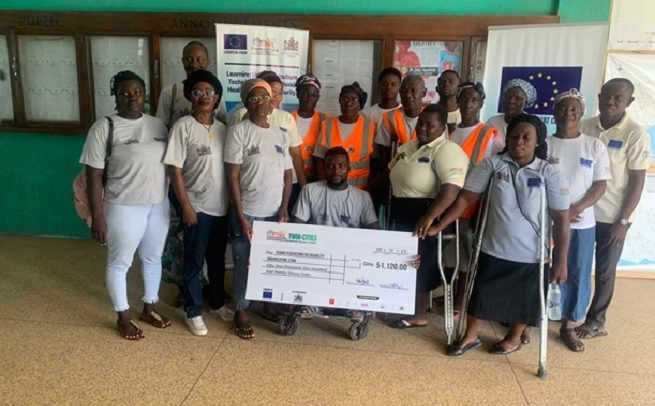Members of the Ghana Federation of Disabled displaying the cheque
EIGHT SOCIAL enterprises, made up of about 240 youth within the Sekondi-Takoradi Metropolis, have been trained in Urban Agriculture technologies consisting of crop production, animal husbandry and aquaculture.
The eight groups have also received financial and logistical support valued at GH¢284,290.00 to help them establish their respective businesses and support the growth of the local economy.
The training was under the Skills Development Training Programme of the European Union (EU)-funded Twin-Cities in Sustainable Partnership Project (TCSPP).
The 240 youth, made up of 164 males and 76 females, included 26 People with Disabilities (PwDs). They were guided after the four months classroom and practical training sessions to form groups and be registered as social enterprises.
They were taken through greenhouse technical agronomic training which focused on the growing cycle of tomatoes and cucumbers, nursery set-up and media preparation, seedling transplanting, irrigation and fertiliser application.
The rest were pruning and trellising, pollination, pest and disease control, farm hygiene, fruit setting, harvesting and packaging, among others.
In addition, they were given training in book-keeping to enable them keep proper accounts of their businesses.
The eight beneficiary social enterprises included Ghana Federation for Disabled; Catholic Special Vocational School; Egyam Children’s Home; Urban Organic Limited; Inchaban Cooperative; Sekko Gloryland; Whindo Unique and Twin City Smart Women.
The Sekondi-Takoradi Metropolitan Chief Executive, Abdul -Mumin Issah, revealed that a total of 412 people have undergone training in urban agriculture technologies since the beginning of the project in 2022.
“Without doubt, the Skills Development Training of the EU-funded TCSPP is impacting positively the lives of unemployed youth, women, and returned migrants across the metropolis.
“It is also in line with the Government of Ghana’s agenda and the European Union’s commitment to address the challenges of unemployment and food security among others,” he pointed out.
He cautioned the beneficiary enterprises that the support given to them was not meant for irresponsible lifestyles.
The Project Coordinator, Isaac Aidoo, prevailed on the beneficiaries to work hard to multiply their respective resources to benefit others in their communities, adding, “You need to employ more people when your businesses begin to blossom.”
He assured that the activities of the beneficiaries would be monitored and that they would give account of the monies they have received.
FROM Emmanuel Opoku, Takoradi

